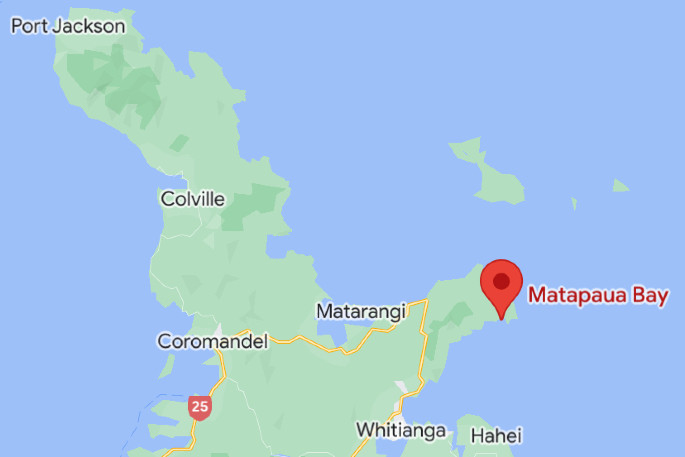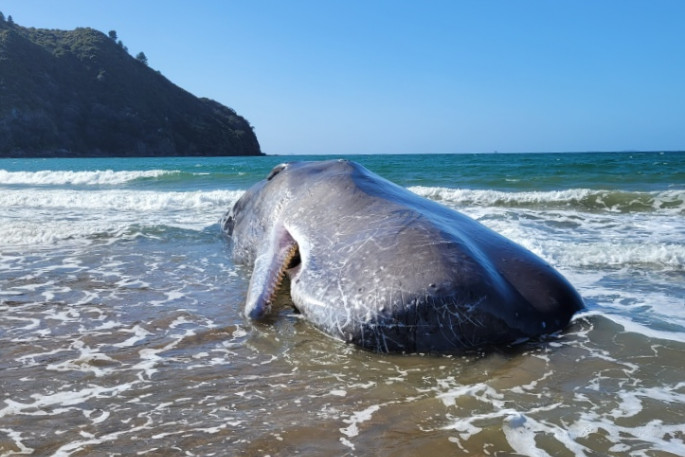A sperm whale has beached in a bay in the Coromandel peninsula.
"We can confirm that a 16-meter dead sperm whale was beached this morning at Matapaua Bay," says Department of Conservation Operations Manager, Nick Kelly.
"DOC is currently working with iwi to relocate it to an appropriate place for burial."
For the time being the Department of Conservation is asking the public to stay clear of the area.

The dead sperm whale beached on Saturday morning at Matapaua Bay. Image: Google Maps.
Some facts about sperm whales from the Department of Conservation website:
Sperm whales are widespread around the world, but have a patchy distribution.
A sperm whale – or Physeter macrocephalus - can grow to a length of 11 -18 m as an adult
They prefer deep water greater than 200 m and so are usually found offshore and in areas with submarine canyons, such as Kaikoura, where sperm whales are present all year round.
They generally move towards the poles in summer, males more so than females and juveniles. Females usually inhabit water deeper than 1000 m at latitudes less than 40-50°. Male distribution extends to more temperate latitudes.
Population
Kaikoura is home to the most well studied New Zealand population of sperm whales; it includes both resident and transient individuals, mostly males. It appears that there is no other area in the world where this species is routinely found so close to the coast.
In November 2016, a 7.8 magnitude earthquake triggered a ‘canyon flushing' event in the submarine canyon of Kaikoura. Underwater landslips and turbidity currents caused significant changes to the seafloor and removed large quantities of benthic biomass from the canyon. The impact of the earthquake on habitat use by sperm whales was examined to look at changes in their behaviour, foraging distribution and use of food resources before and after the earthquake. Observations suggested that the earthquake caused alterations in the foraging patterns of sperm whales over a period of at least 12 months. Read more about that here
DOC's work
DOC undertakes management and monitoring of Kaikoura whale-watching operations in an attempt to mitigate the effects of tourism on this species. Studies on the effects of tourism on sperm whales have found them to react negatively to rapid approaches by vessels, sudden changes in speed and close approaches
DOC is also responsible for managing stranding events.
Whale strandings
New Zealand is a hotspot for marine mammal strandings. Since 1840, more than 5,000 strandings of whales and dolphins have been recorded around the New Zealand coast. Strandings occur all year round and usually involve just one or two animals.
DOC manages whale strandings and rescues, with the help of local communities, volunteers, and organisations like Project Jonah. DOC responds to an average of 85 stranding incidents per year, usually of single animals.
The most common species that strand alone are common dolphins, pygmy sperm whales, and beaked whales. Occasionally mass strandings occur and the majority of these are long-finned pilot whales. Large whales such as sperm whales have been known to strand occasionally
DOC is legally responsible for implementing the Marine Mammals Protection Act 1978. This means that we are in charge at marine mammal stranding events. As the lead decision maker, their responsibilities include:
- protecting the welfare of stranded animals
- disposing of any dead marine mammals
- ensuring the health and safety of staff, volunteers, and the public
- enabling cultural protocols – this involves consulting with local iwi and hapū through every step of the stranding, including rescue, euthanasia, sampling and disposal
- enabling research, eg through the collection of scientific samples.
Helping at a stranding
Anyone can help out at a stranding event as long as they are physically able.
To be more prepared to help at a stranding you can attend a Marine Mammal Medic Course run by Project Jonah. Medics who have completed the course will be well equipped to help rescue stranded whales and dolphins and can act as a role model to untrained rescuers.
Being trained by Project Jonah means you will be more aware of the rescue process, including health and safety risks, which makes the process run more safely and smoothly.
Report whale sightings
You can report sightings of whales to the Department of Conervation hotline 0800 DOCHOT (0800 362 468). You can also report a sighting online.
Reports of sightings are always valuable and help increase the knowledge of whale distribution and movements around New Zealand.
You can also help keep their environment clean by taking rubbish home with you or disposing of it appropriately on land. Some rubbish can be lethal to whales.
For more information on sperm whales please click here



0 comments
Leave a Comment
You must be logged in to make a comment.